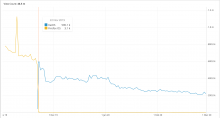The Inuka team is getting ready to deploy a Wikipedia app for KaiOS, and we need to make sure that its page views are counted properly.
Based on the pageview definition and the server-side filtering code, this is what needs to happen:
- Analytics adds a regex matching the app's user agent to the filtering code
